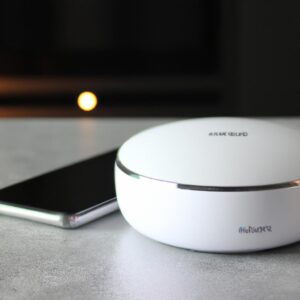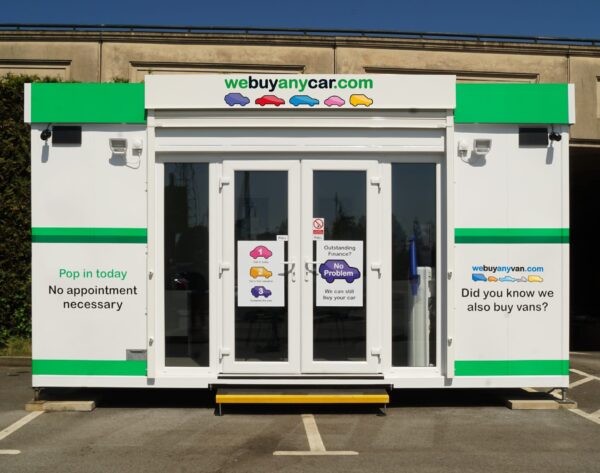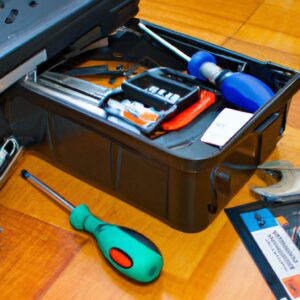Get Ready to Control Your Smart Home”

What are the Essential Components of a Smart Home?
A smart home is one that is equipped with the latest technology to provide convenience, comfort, security, and energy-efficiency. By having the right essentials in place, homeowners can automate their home and make life easier. The following components are essential for any smart home:
- Security essentials such as smart door locks, surveillance cameras, alarms etc.
- Automation essentials such as thermostats, lighting, and window shades
- Connectivity essentials including hubs and routers for optimum performance
- Audio essentials like speakers, sound systems, and VoIP services
- Lighting essentials such as bulbs and lighting systems
Smart homes offer a wide range of benefits, from energy efficiency to enhanced security and convenience. By investing in the right smart home essentials, you can create a powerful and secure smart home setup.
Overview of Smart Home Technology
The smart home industry has seen tremendous growth in recent years, with new products being released regularly. Smart homes are designed to automate and simplify our lives, offering convenience with just a few clicks of a button.
Today, there are many different types of smart home products available, ranging from voice-controlled virtual assistants and intelligent lighting to smart door locks and surveillance cameras.
Each product offers its own features and benefits, such as temperature control, improved energy efficiency, remote access, and voice command. With the right combination of products, you can create a fully automated home with maximum security and comfort.
While a smart home may require a hefty investment, the cost can be offset with energy savings and increased resale value of your home.
Security Essentials
When it comes to creating a smart home, security should be the top priority. The most important security essentials to consider are smart door locks, surveillance cameras, and alarms. Smart door locks can be connected to your phone or voice assistant, allowing you to control access to your home remotely. Surveillance cameras are helpful for monitoring any activity around your home and can be set up in multiple locations. Alarms provide an additional layer of protection as they will alert you when someone is attempting to enter your home.
These security essentials can be customized to suit your specific security needs. For instance, you can set different access levels for family members, friends, and service providers. Likewise, you can be selective about what kind of activities you want to monitor through surveillance cameras and create customized alerts with alarms.
Automation Essentials
Smart home automation is one of the most beneficial aspects of a smart home, allowing you to control various devices through one system. Automating your home allows you to manage the climate, lighting, and even window shades from the comfort of your couch or anywhere in the world.
Thermostats are a basic and important component of any smart home, allowing you to control the temperature settings while also tracking home energy usage. Smart thermostats, such as Nest Learning Thermostat, provide a range of options such as automatic scheduling, remote access, and voice controls.
Smart lighting systems offer convenience and energy-efficiency by allowing you to adjust the brightness and color of lighting in different rooms of your home. You can even automate the lights so they turn on when someone enters a room.
Smart window shades are a great addition to any home as they provide light control and privacy. They can be automated to open and close at predetermined times based on the sunlight or they can be manually adjusted with just a few taps of a button.
Connectivity Essentials
Creating a smart home means adding devices that allow you to control your home from your phone, tablet, laptop or other connected device. To do this you will need to think about what kind of network you want in your home.
You can either connect your devices to a central hub – usually a router – that acts as a bridge between the internet and the other devices. Or you can connect them all directly to your phone, giving you more control over what is connected.
When deciding on a hub and router for your home, there are a few things to consider. Make sure you get one with a strong signal, reliable speed and good security. Also look for one with easy set up and good customer support.
It’s also important to make sure you have compatible devices for your chosen network. If most of your devices are made by the same company, then you should use their networking system. However, if you’re using a variety of different devices, then you may want to consider a universal networking system.
Now that you know how to link your home to your phone and pick the best network for your devices, you’re almost ready to start building your smart home.
Audio Essentials
Setting up the audio system in your smart home is an important aspect when it comes to comfort and convenience. It’s important to have a sound system that not only provides the highest quality of sound, but also ensures reliable performance. To get the most out of your audio system, here are a few key essentials you should consider:
- Speakers: Depending on the size of your home, you need to decide on the number and type of speakers you should use. Smaller homes may only require a single speaker or two, while larger homes may require multiple units.
- Sound Systems: Audio systems come in different forms such as wired, wireless, and multi-room systems. Wired systems offer superior sound quality but require physical connection cables. On the other hand, wireless systems provide the freedom to set up your sound system anywhere. Multi-room systems also allow you to control audio from different rooms.
- VoIP Services: VoIP (Voice over Internet Protocol) allows users to make phone calls over the internet rather than using traditional landlines. It is an affordable and convenient option for those wanting to stay connected over long distances.
Ensuring your smart home has the right audio setup can be a daunting task, so take your time to review various sound systems and find the best one for your needs.
Lighting Essentials
When building a smart home, lighting is an important factor to consider. Having the right bulbs, lighting systems and their energy efficiency will help you save money in the long run.
Smart lighting can be divided into two main categories: smart bulbs and smart lighting systems. Smart bulbs are the most commonly used and come in a variety of shapes, sizes and colors. Smart lighting systems usually connect to a hub or router, allowing for various controls such as dimming, scheduling and automation.
When choosing bulbs, you should also be aware of their energy efficiency. LED bulbs are the most energy efficient and offer longer lifespans while also being more affordable. Halogen and fluorescent bulbs are slightly less energy efficient but still offer great features and brightness.
Next, smart lighting systems provide enhanced lighting control and automation. The most common type is a Wi-Fi enabled system which allows you to control the lights from any smartphone, tablet or computer. Other types include Bluetooth, Zigbee, and Z-Wave systems. Whichever system you choose, make sure it is compatible with your other smart home products.
Potential Pitfalls of Smart Home Essentials
When looking into the world of smart home essentials, there are some potential pitfalls to be aware of. Despite these concerns, setting up a smart home can still be a successful endeavor – provided that the necessary precautions and safety tips are followed.
It’s important to remember that technology is constantly changing and evolving, so it’s essential to stay up-to-date on the latest products. This involves keeping an eye out for new updates, as well as reading customer reviews and researching manufacturers. Additionally, it’s important to be mindful of compatibility issues between different products and networks, as well as understanding the limitations of a particular product.
By investing in products with built-in security features, it can help protect you from hackers. Thermostats and smoke alarms should be fitted with long-lasting batteries, while locks should have encrypted passwords that are routinely changed.
Overall, it’s essential to be mindful of what you’re connecting to your home network as each device can pose a potential security risk. It’s important to be vigilant in monitoring your system for any suspicious activity, and to be sure to follow all safety guidelines.
Comparing Prices For Smart Home Essentials
When it comes to setting up a smart home, one of the most important considerations is the cost. It’s important to be aware of the pricing structure across all the specific brands before making any purchasing decisions. Doing research on the various items you’re looking for and comparing prices between different providers will help you make an informed decision.
One way to get started is by looking at online reviews and ratings to help you figure out which products are worth the price. You can also check out local stores for sales and discounts. Additionally, there are also many discounts available for bulk purchases, so if you are buying multiple items, you may be able to get a better deal.
It’s also a good idea to have a budget in mind when shopping for smart home essentials. Know what types of features you need and prioritize accordingly. Once you know your budget and what you want to buy, it should be easier to compare prices of similar products.
By taking the time to do your research and compare prices, you can ensure that you get the best value for your money and end up with the perfect smart home essentials for your needs.
Budgeting for Your Smart Home
One of the main concerns when it comes to purchasing a smart home is the cost. After all, you want to make sure you’re getting the best value for your money. Here are some tips to help you stay within budget while still obtaining all of the essential items you need:
- Create a detailed list of the items you need and prioritize them by importance.
- Compare prices between different brands and stores. Don’t be afraid to look for discounts or sales that could help lower the price.
- Consider buying used items if they’re in good condition and come with a warranty.
- Shop around for the best deals on things like installation fees and shipping costs.
- If possible, consider using a store credit card in order to take advantage of any discounts or promotions.
These tips should help you more accurately plan your budget and still get the essential items you need for your smart home. With a little bit of research and careful shopping, you can be sure to get the most bang for your buck.
Benefits of Using Smart Home Essentials
A smart home offers many advantages and conveniences for homeowners looking to modernize their living space. Thanks to the latest in tech, it’s now possible to automate virtually every aspect of your home with just the touch of a button. Home automation systems allow you to control lighting, climate, security systems, audio and visual components, and much more.
By using smart home essentials, you can save money on energy costs, as well as increase the security of your home. Smart thermostats can be programmed to turn off or adjust temperature based on your activity. Smart locks and surveillance cameras will add an extra layer of security to your home, protecting both your property and family. And with the help of audio and lighting systems, you can create the perfect atmosphere for any occasion.
Using smart home technology also grants you the luxury of being able to monitor all of your home’s activity from anywhere in the world. With the help of a smartphone app or other connected device, you can check in on your home anytime from anywhere and make sure everything is running smoothly.
Creating a Successful Smart Home
Creating a smart home can be an exciting and inspiring experience. With the right kind of technology you can make your home more safe, energy efficient, and comfortable. It’s important to consider all the essentials for your smart home, such as security features, automation equipment, connectivity, audio systems, lighting, and budgeting so that you can create a custom setup to suit your needs.
Security is essential when creating a smart home. Smart door locks, surveillance cameras, and alarms are just a few of the available products that can keep your family safe. Automation can increase energy efficiency and provide convenience when you’re controlling lights, thermostats, and window shades. Ensure you have the best hubs and routers for optimum performance, as well as the best quality speakers, sound systems, and VoIP services for audio. You should also look into different bulbs and lighting systems that will work well with your setup, and provide energy efficiency.
When building out your smart home, it is important to look out for potential pitfalls while taking the necessary precautions. Reasonably understand the pricing structure among the brands on the market, and stay within budget to get the desired essentials. There are many advantages and conveniences that come with implementing the latest technology at home, so be sure to take advantage of them.
In conclusion, creating a successful smart home requires planning and researching the available products to suit your lifestyle. Be mindful of the security, automation, connectivity, audio, lighting, and budget aspects of your home, and check for potential issues and safety tips before making any decisions.
comments: 0





